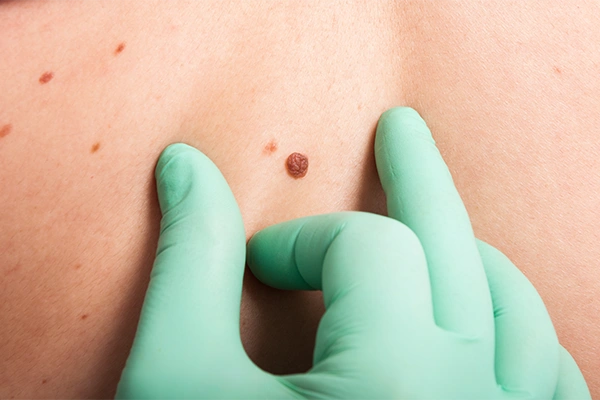Skin Cancer
Dermatology Associates of Central NJ
Dermatologists & Mohs Surgery located in Old Bridge, Toms River, Union & Freehold, NJ
Skin cancer is the most commonly occurring type of cancer among Americans today, but it’s also one of the most treatable forms of cancer. At Dermatology Associates of Central NJ, the team of highly trained dermatologists can help with skin cancer diagnosis, treatment, and prevention, so don’t hesitate to get the expert help you need. Use online booking or call to arrange a visit at the Old Bridge, Union, Toms River, or Freehold, New Jersey, location now.
Skin Cancer Q & A
What is the most common skin cancer?
The most frequently occurring type of skin cancer is basal cell carcinoma. This kind of skin cancer happens when you get too much UVB exposure. Usually, basal cell carcinoma looks like a little pink or white-colored growth, a mole, or a waxy growth.
Basal cell carcinoma usually develops on the face or neck, although it can develop anywhere that gets a lot of sun exposure.
What is squamous cell carcinoma?
Squamous cell carcinoma is the second-most frequently occurring kind of skin cancer. Like basal cell carcinoma, squamous cell carcinoma is usually connected to sun exposure. Squamous cell carcinoma is usually brown or red, and it typically manifests as flat or semi-flat patches.
Although squamous cell carcinoma can grow anywhere, it's most common in the areas that get the most sun exposure, including the ears, neck, and face.
What is melanoma?
Melanoma is the rarest type of skin cancer, and it's also the most dangerous. Usually, melanoma develops after a history of overexposure to either sunlight or artificial light like tanning beds.
Melanoma is usually black or brown, but sometimes it's hard to see because it can develop inside a preexisting birthmark.
How is skin cancer diagnosed?
Your dermatologist at Dermatology Associates of Central NJ does a thorough skin exam and then performs a biopsy to confirm the diagnosis. As soon as your dermatologist diagnoses the cancer, effective treatment can start right away.
What is the treatment for skin cancer?
Skin cancer treatment depends on the kind of cancer, the size of the growth, and its location. In the majority of cases, your Dermatology Associates of Central NJ dermatologist can administer local anesthesia and erase the cancerous growth in a short outpatient procedure. The exact removal technique can vary, with some of the options including:
- Cryosurgery: Freezing the growth with liquid nitrogen before removing it
- Excision: Removing the cancerous growth and a bit of the tissue around it
- Laser therapy: Using a laser to erase the cancer with minimal impact on surrounding tissue
- Mohs surgery: Removing cancer growth in increments until it's all gone
- Chemotherapy: Erasing cancer with chemotherapy drugs within topical creams
Skin cancer is almost always treatable. The earlier you see your dermatologist about a new growth, the higher the chance of successful removal.
Book online or by phone today for skin cancer help.
*Individual results may vary.

Dermatological Services
-
 Morpheus8 Microneedlingmore info
Morpheus8 Microneedlingmore info -
 Chemical Peel - VI Peelmore info
Chemical Peel - VI Peelmore info -
 Acnemore info
Acnemore info -
 Botoxmore info
Botoxmore info -
 Mohs Surgerymore info
Mohs Surgerymore info -
 Mole Removalmore info
Mole Removalmore info -
 CoolSculptingmore info
CoolSculptingmore info -
 Eczemamore info
Eczemamore info -
 Rashesmore info
Rashesmore info -
 Rosaceamore info
Rosaceamore info -
 Skin Cancermore info
Skin Cancermore info -
 Hair Lossmore info
Hair Lossmore info -
 Wartsmore info
Wartsmore info -
 Skin Infectionsmore info
Skin Infectionsmore info -
 Tattoo Removalmore info
Tattoo Removalmore info -
Superficial Radiotherapymore info
-
 Juvedermmore info
Juvedermmore info -
 HydraFacialmore info
HydraFacialmore info -
EvolveXmore info
-
 SKINPENmore info
SKINPENmore info -
 Dermaplaningmore info
Dermaplaningmore info




















